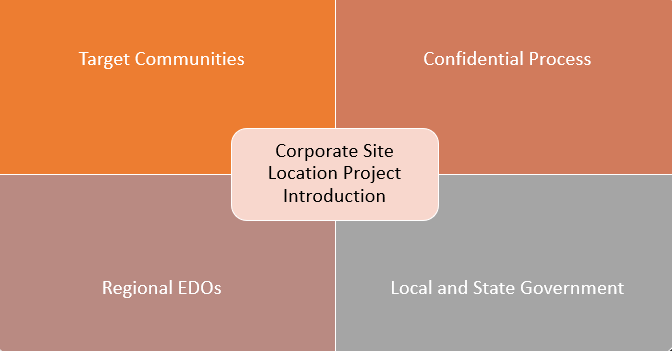Amazon’s HQ2 public corporate site location process is not the typical corporate site location project introduction. Corporate site location project introductions need to be focused on a handful of communities based upon a data driven analysis, kept confidential if possible and communicate everything the company needs in a site without relaying who the company is, and utilize regional economic development organizations while recognizing that most often local and state governments control land use entitlement and economic development incentive approval.

Target Communities. Market research should dictate communities that should be considered for corporate site location negotiations. This market research should be focused on regional macroeconomics, demographic, workforce, industry cluster, cost of doing business and customer and supply chain analysis. Market research may consider a larger number of communities, but successful corporate site location projects narrow down to a handful of communities to keep the corporate site location project on track from a timing standpoint. No location should be considered that the company would not be comfortable locating in. No location should be considered based solely on economic development incentives. Incentives are the “icing not the cake.” Cake tastes better with icing but a complicated site in an expensive market not connected to a company’s industry or supply chain is not made better with economic development incentives. In fact, locations that may be the best fit may not even have economic development incentives attached to it.
Confidential Process. The introduction of a corporate site location to a local community needs to be a confidential process. An open public corporate site location process as used by Amazon for their HQ2 project is not recommended. This open process creates too many unhappy regions as hundreds may apply for a corporate site location project and only a handful are even considered. More importantly, if a company is considering consolidating or moving facilities, a detailed communications plan to employees needs to be in place rather than employees reading about a potential move in the news media. A better approach is to use a data driven, confidential process that does not become public until approvals for land use entitlements and incentives are underway. Companies launching corporate site location project should be sensitive to state public records law which can jeopardize their confidential process. Ohio’s Public Records act applies to “public records,” which are “records kept by any public office.” The term “public office” is defined to include “any state agency, public institution, political subdivision, or other organized body, office, agency, institution, or entity established by the laws of this State for the exercise of any function of government.” Cities, counties, port authorities and Community Improvement Corporations are all public offices, but many of the other Special Purpose Entities are not “public offices” by statute. As a result, each entity must undergo an analysis to determine if compliance with the Public Records Act might be required. Notably, however, the Public Records Act specifically provides that JobsOhio, the nonprofit corporation that promotes job creation and economic development in Ohio, is not a public office under the Public Records Act. Not only is JobsOhio not a “public office,” but by statute, its records are not public records.
Regional EDO Communication. A confidential Request for Proposal or project letter is then sent from a corporate site location consultant or legal counsel that outlines the nature of the corporate site location project and the specific needs of the company related to the site in question with specific infrastructure, workforce, incentive and site needs. Regional economic development organizations within or through a public-private-partnership with business are the prime point of contact for launching a corporate site location project.

Larger metro regions are served by private sector organizations supported by public and private sector resources and whose prime focus is the market their region for business retention and expansion projects. These organizations are not able to approve land use decisions or award economic development incentives, but they can prove an effective resource to guide corporate site location projects. A prime benefit of these private organizations is that they are not regulated by public records laws and can operate in a confidential basis built upon a non-disclosure agreement. These regional economic development organizations can locate sites, access local macroeconomic, demographic, workforce and industry cluster data that can confirm a company’s research of the region, coordinate conversations with local and state government entities for land use entitlement and economic development incentives, coordinate site visits and act as the point of contact for company corporate site location searches. Some states, like Ohio, Michigan, Florida and others operate with a private sector economic development corporation coordinating the state’s economic development programs.
Local and State Governments. A wide range of local and state government entities may be involved in project introductions as well as these entities have the authority and resources to award land use entitlements and economic development incentives where private regional economic development organizations do not. State, municipal, township and county governments all may be relevant for the corporate site location process as they by state law implement land use entitlements, award property tax abatements and may have their own performance based economic development incentives to award. Local governments may also operate special purpose entities that implement a range of economic development programs relevant to corporate site location projects. Special purpose entities may include port authorities that provide project financing and construction materials sales tax exemptions, joint economic development districts that develop sites in partnerships with townships and cities, transportation improvement districts which act as a conduit for large scale transportation projects, community improvement corporations or community urban redevelopment corporations which are quasi-public agencies that operate economic development initiatives often targeted to a specific geographic area, or new community authorities which are quasi-public agencies that can assess property owners to fund public infrastructure and other projects.
Please contact Dave Robinson at the Montrose Group at [email protected] if you need assistance with your company’s corporate site location process.